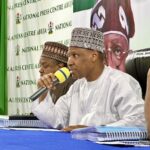In the search for urgent solutions to the current morass in the Nigerian economy, we must inevitably embrace the concept of supply-side economic policy framework. That will pull the nation back from the brink. It is beyond controversy that the Nigerian economy has been stretched to the limit of what the current configurations can permit; therefore, only a move that shifts the total production possibility curve rightwards can attempt to address the supply constraints.
The economy as it is today cannot experience an inclusive growth. In other words, it cannot reasonably be expected to create jobs, so the best it can do is generate a jobless growth. Even such a growth will be unsustainable because it will soon dry up, not being supported by any strong fundamentals.
Therefore, the best option is what President Bola Tinubu announced in his Independence Day speech: his administration is moving ahead with its fiscal reforms. In this proposal, two key aspects of his administration’s reforms that will gain traction soon are the fiscal and political economy reforms. Today we will deal with the fiscal reform and what it should imply.
We need to stimulate this economy because it has reached its limit as far as the present structure is concerned. Only fiscal boost to it can stimulate the productive force of the economy right now. And accepting this fact implies that the managers of the economy must be ready to face the task of building an economy in the real sense of it.
This is needed because it has become evident now that a continued dependence on interest rate as an anti-inflation measure will not go far. The President announced what many people had been waiting to hear: the Federal Executive Council approved the Economic Stabilisation Bills, “which will now be transmitted to the National Assembly. These transformative bills will make our business environment more friendly, stimulate investment and reduce the tax burden on businesses and workers once they are passed into law,” he told Nigerians.
Many Nigerians have expectedly cheered this decision. True, as the President noted, the central concern of Nigerians today is the high cost of living, especially food costs. He noted further that indeed, this concern is shared by many around the globe as prices and the cost of living continue to rise worldwide.
In supply-side economics, the emphasis is on the real economy, and the question to ask is: how can we raise production? This is what makes the policy appropriate for this time. The focus of supply-side economics is those who produce the goods that we all consume. It examines the constraints that limit the production and supply of the goods, and seeks ways to eliminate those constraints. Without this, any talk about reflating or stimulating the economy remains questionable.
Ironically, our monetary authorities have concentrated on the interest rate as the key policy instrument to alter the current state of the economy. Effectively, that means that we have been busy trying to constrain production in different ways. Well, the verdict on this is out already. The continued hike in interest rates has been unable to reverse the increase in prices, and it will be unproductive to expect that things will soon change if the interest policy continues to hold sway.
Therefore, the “transformative bills” must of necessity create a new environment in which all economic activities will be domiciled for different results to be achieved. That will also include monetary policies. For instance, it will be futile for us to be reflating or stabilising the economy while at the same time raising the cost of funds in the same economy. That would amount to giving something with one hand and taking the same with the other hand, or two-headed wagon that moves in opposite directions at the same time.
This is particularly so given the level at which the CBN’ monetary policy rate is currently. With a 27.25 per cent MPR and effective interest rates of at least 30 per cent that banks charge the borrowers, interest costs have become a severe constraint on the productive capacity of the economy. This is where the test of the stimulus package will begin.
Surely, it will not be enough for the National Assembly members to sit in Abuja and pass the Stabilisation Bills and for the President to append his signature to them. These will be the starting point of what will definitely be a long journey. While the reduced tax payments will leave more money for companies to work with, a high interest-rate, high production-cost environment will surely make a mince of the funds that the companies might be left with.
So, getting the bills into actions as laws is one thing, getting the actions to begin will be an entirely different thing. The authorities must find a way to enhance production – how to raise production in the true sense of it. Official protocol in our system has a way of slowing things down. Therefore, getting the economy to produce more goods to address the current supply deficit will require all regulatory agencies to work at their best. We must address infrastructure deficits – power, roads, railway, and energy- all of which impede economic activities and raise costs.
The relief will come when we see Nigerians, who right now are postponing consumption begin to consume once again. The results will show on our GDP in terms of rising consumption, investments (both replacement and new), and growth in exports. We might as well see changes in savings. Until then, these will remain constrained.
 Join Daily Trust WhatsApp Community For Quick Access To News and Happenings Around You.
Join Daily Trust WhatsApp Community For Quick Access To News and Happenings Around You.


